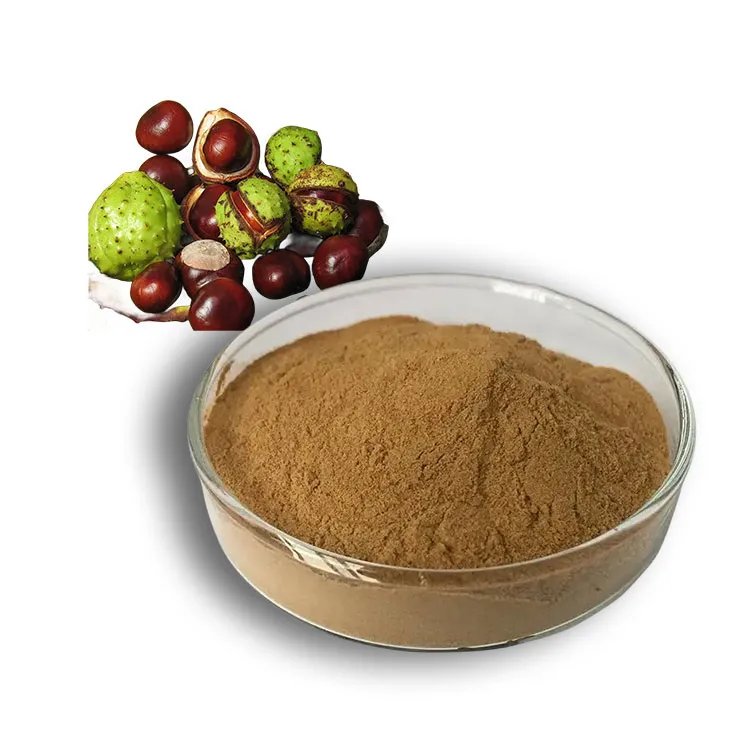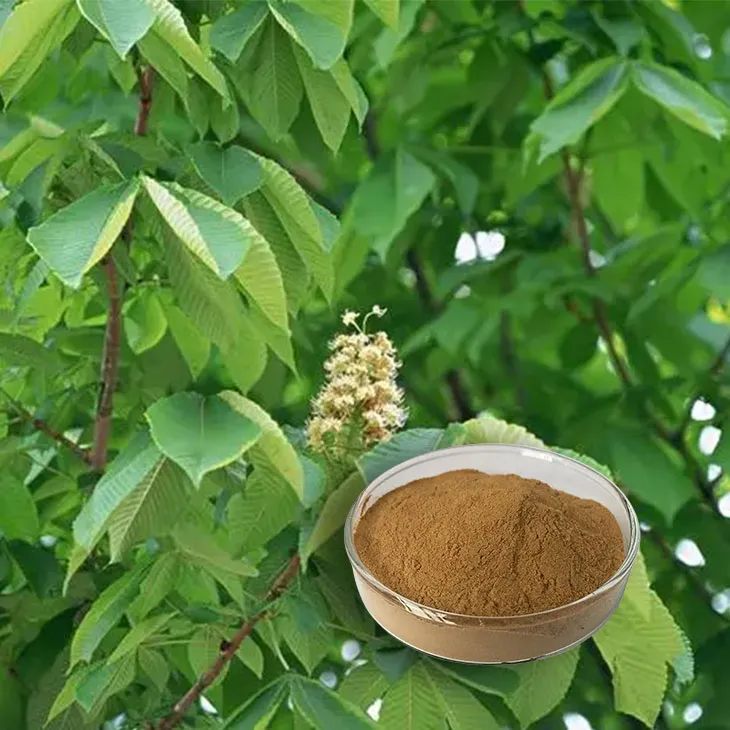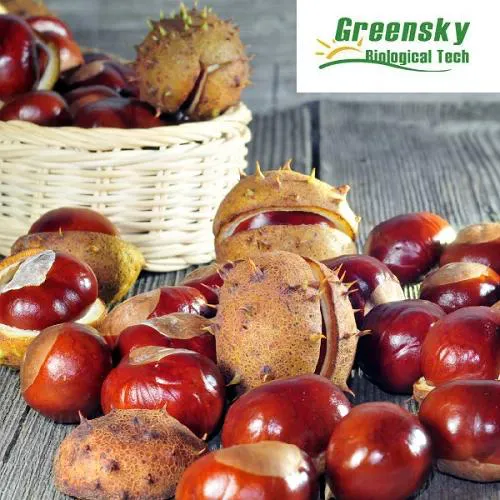- 0086-571-85302990
- sales@greenskybio.com
Our Guide to the Best Horse Chestnut Extract in the UK.
2024-12-22

Introduction
Horse Chestnut Extract has been gaining popularity in the UK for its numerous potential health benefits. This extract is derived from the horse chestnut tree, scientifically known as Aesculus hippocastanum. In this comprehensive guide, we will explore everything there is to know about Horse Chestnut Extract in the UK, from its chemical composition to its uses, regulations, and quality assurance.

Chemical Composition
The main active compounds in Horse Chestnut Extract are aescin and flavonoids. Aescin is a mixture of saponins, which are known for their anti - inflammatory and antioxidant properties. Flavonoids, on the other hand, contribute to the overall antioxidant activity of the extract. These compounds work together to provide the potential health benefits associated with horse chestnut extract.

How it Interacts with the Human Body
1. Anti - Inflammatory Effects
Aescin, the key compound in horse chestnut extract, has been shown to inhibit certain enzymes involved in the inflammatory process. By reducing inflammation, it can potentially help with conditions such as arthritis and joint pain. For example, in a study, participants with osteoarthritis who took horse chestnut extract reported a reduction in pain and improved joint function.
2. Effects on the Circulatory System
Horse chestnut extract may also have a positive impact on the circulatory system. It is believed to strengthen the walls of blood vessels, improving their elasticity. This can lead to better blood flow, which is beneficial for conditions like varicose veins. A study found that individuals with varicose veins who used horse chestnut extract experienced a reduction in symptoms such as swelling and pain.

Uses for Various Ailments
Skin Conditions
- Horse chestnut extract has been used topically for skin conditions such as eczema and psoriasis. Its anti - inflammatory and antioxidant properties can help soothe irritated skin and reduce redness.
- Some skincare products containing horse chestnut extract claim to improve skin texture and promote skin healing.
Circulatory Problems
- As mentioned earlier, it is effective in treating varicose veins. It can also be beneficial for those with chronic venous insufficiency, a condition where the veins have difficulty returning blood to the heart.
- Some people use horse chestnut extract to reduce the risk of deep - vein thrombosis, although more research is needed in this area.
Joint and Muscle Pain
- For those suffering from joint pain, whether it's due to arthritis or overexertion, horse chestnut extract can provide relief. It can reduce inflammation in the joints, allowing for better movement.
- Similarly, in cases of muscle soreness, the anti - inflammatory properties of the extract can help speed up the recovery process.
UK - Specific Regulations
1. Licensing
In the UK, horse chestnut extract products are subject to certain regulations. Dietary supplements containing horse chestnut extract must be licensed. The licensing process ensures that the product is safe for consumption and that the claims made about its benefits are supported by evidence.
2. Quality and Purity Standards
There are strict quality and purity standards for horse chestnut extract products. Manufacturers are required to ensure that the extract is free from contaminants such as heavy metals and pesticides. This is to protect the health of consumers who use these products.
Quality Assurance
1. Third - Party Testing
To ensure the quality of horse chestnut extract products, many manufacturers opt for third - party testing. Third - party laboratories can independently verify the composition and purity of the extract. This gives consumers an added level of confidence in the product they are purchasing.
2. Good Manufacturing Practice (GMP)
Manufacturers of horse chestnut extract products in the UK are expected to follow Good Manufacturing Practice (GMP). GMP guidelines cover various aspects of production, including raw material sourcing, manufacturing processes, and quality control. By adhering to GMP, manufacturers can ensure that their products are of high quality and consistent.
Conclusion
Horse chestnut extract has a wide range of potential uses and benefits in the UK. Understanding its chemical composition, how it interacts with the human body, and the regulations and quality assurance surrounding it is crucial for consumers who wish to use it for various health conditions. By choosing products that are compliant with UK regulations and have undergone quality assurance measures, consumers can have more confidence in the effectiveness and safety of horse chestnut extract.
FAQ:
What is Horse Chestnut Extract?
Horse Chestnut Extract is derived from the horse chestnut tree. It contains active compounds such as aescin, which is believed to have various beneficial properties for the human body. It has been studied for its potential effects on things like reducing inflammation and improving circulation.
What are the main uses of Horse Chestnut Extract in treating skin conditions?
For skin conditions, Horse Chestnut Extract may help due to its anti - inflammatory properties. It can potentially reduce redness, swelling, and itching. Some people use it for varicose veins close to the skin surface as it may strengthen the blood vessels and improve the appearance of the skin in those areas.
How does Horse Chestnut Extract interact with the circulatory system?
It is thought that the aescin in Horse Chestnut Extract can help improve the function of the veins. It may reduce the permeability of the capillary walls, which helps in preventing fluid leakage. This can lead to better blood flow, especially in the legs where issues like venous insufficiency can occur.
Are there any side effects of using Horse Chestnut Extract?
Some possible side effects may include mild stomach upset, nausea, or headache in a small number of users. However, it is important to note that it should not be used by pregnant or breastfeeding women without medical advice, as its safety in these situations has not been fully established.
What are the UK - specific regulations for Horse Chestnut Extract products?
In the UK, Horse Chestnut Extract products are regulated as dietary supplements. They need to meet certain quality and safety standards. Manufacturers are required to ensure that the product is properly labeled with ingredients, dosage instructions, and any potential warnings. The extract also should be sourced and processed in accordance with good manufacturing practices.
Related literature
- The Benefits and Risks of Horse Chestnut Extract"
- "Horse Chestnut Extract: Chemical Composition and Therapeutic Applications"
- "UK Regulations on Botanical Extracts: A Focus on Horse Chestnut"
- ▶ Hesperidin
- ▶ Citrus Bioflavonoids
- ▶ Plant Extract
- ▶ lycopene
- ▶ Diosmin
- ▶ Grape seed extract
- ▶ Sea buckthorn Juice Powder
- ▶ Fruit Juice Powder
- ▶ Hops Extract
- ▶ Artichoke Extract
- ▶ Mushroom extract
- ▶ Astaxanthin
- ▶ Green Tea Extract
- ▶ Curcumin
- ▶ Horse Chestnut Extract
- ▶ Other Product
- ▶ Boswellia Serrata Extract
- ▶ Resveratrol
- ▶ Marigold Extract
- ▶ Grape Leaf Extract
- ▶ New Product
- ▶ Aminolevulinic acid
- ▶ Cranberry Extract
- ▶ Red Yeast Rice
- ▶ Red Wine Extract
-
Okra Extract
2024-12-22
-
Longan Extract
2024-12-22
-
Bamboo Leaf extract
2024-12-22
-
Shikonin
2024-12-22
-
Lemon Balm Extract
2024-12-22
-
Apricot Powder
2024-12-22
-
Mangosteen extract powder
2024-12-22
-
Diosmin
2024-12-22
-
Bilberry Extract
2024-12-22
-
Beetroot Powder
2024-12-22





















